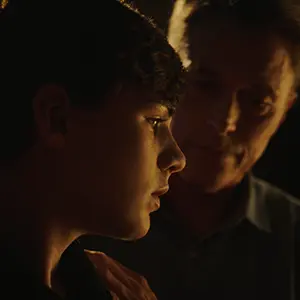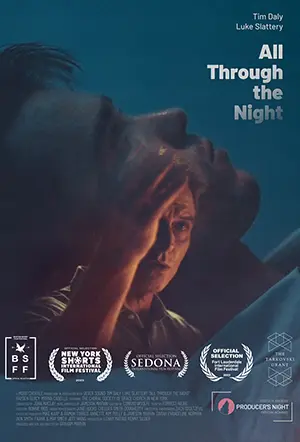
Fight Alzheimer’s Into 2026 and Beyond
Fight Alzheimer’s Into 2026 and Beyond
Don’t miss your chance to make a generous gift to our 2026 Annual Fund Drive to help fund essential care and support and advance critical Alzheimer’s research.
Give MonthlyShort Film “All Through The Night” Focuses on a Father Living With Alzheimer’s and His Son
“All Through The Night” is a 20-minute short film starring actor Tim Daly (of “Madam Secretary”) as Alexander, the father living with Alzheimer’s and Luke Slattery (of “Boys in the Boat”) playing his son, Neil. We spoke with Tim and writer/director Graham Marvin about the film and why it is an important project to both of them.
Graham, tell us about your inspiration for this story/film.
My dad is a retired (yet still active) choral conductor, composer, teacher and author. I grew up going to all of his concerts. I remember sitting in the crowd at his final concert in 2019 thinking about how much our relationship and my relationship with his music have changed over the years. When I was a kid I didn’t always love going to his concerts or really understand them. But as I got older, I found beauty and appreciation in his work. And, it was frankly difficult to express that.
Music was the initial driver in my idea to write a story about a son’s relationship with his father told over the course of his relationship with music and art. The second driver was my dad himself. He is older than the average father my age – he is 82 and I am 34. He doesn’t have dementia but at times he can be a bit forgetful about details. What I like to call “artist’s brain.” That along with an awareness of the reality of his aging can provoke a fear of when and how I might notice changes in him as he grows older.

There is this interesting link between music and memory. I felt there was a profound opportunity to incorporate Alzheimer's disease and how it impacts not only those who have it, but the people around them – caregivers, family members and friends. I thought this story was an interesting way to explore all of that. It dawned on me: that was also the way I could explore both my exacerbated fears relating to my father again and my growing appreciation of his music. We went full circle when I invited my dad to join me as a collaborator on the film. Not only did he arrange the choral music for the titular song performance, but he helped Tim learn how to conduct.
Graham, what was the best part about working with Tim in creating this on screen relationship?
I’m forever grateful to Tim for doing this film. I enjoyed the research and discovery phase with him to flesh out what this father-son relationship would be like at two different points of each of the character’s lives. We would ask each other scenario and response questions to determine the mindset of our characters and their relationship as it evolved.
If you had to care for someone with Alzheimer’s for an evening, what would their needs be? There is a brief, delicate moment in the film – that I think we depicted in a respectful way – when Alexander’s (Daly) caregiver tells Neil (Slattery) that his father may need to be changed overnight and asks if he’s comfortable changing him.
Tim was an amazing partner in terms of finding the specificity and details with the disease experience, like this, that people may not immediately think of when they think about Alzheimer’s. What I valued and respected was how important finding the truth in his character was to Tim.
Tim, can you talk more about how you prepared to portray someone living with Alzheimer’s, as well as the family dynamics in the midst of a progressive disease?
I spoke with Joe Montminy, a former Alzheimer’s Association Early Stage advisor, who is living with early-onset Alzheimer’s and a father himself. I wanted to hear from someone experiencing dementia.

Dementia is unpredictable. It’s hard to draw a straight line between something that happens and the way the person with dementia will react. I’ve been on the receiving end where I’ve experienced someone with dementia not knowing who I was. Then I left the room to grab a cup of coffee and when I returned the person said “Hey Tim, how are you doing? It is cruel what Alzheimer’s does, not only to the person who has it, but to their families. But we cling onto those lucid moments with hope.
Families are complicated. There are a lot of ways of expressing love. Sometimes the way love is expressed can be hurtful. There’s an element of my character that is a bit narcissistic. He is focused on his own world so intensely that he is dismissive of his son. He is somewhat disappointed that his son doesn’t appreciate music in the way that he does. At the same time, there is a lot of love. There is forgiveness. One of the beautiful things about this story is the example of how change is inevitable, but it can be navigated.
Tim, you had to depict having two different stages of Alzheimer's. Can you talk about that experience?
The beginning stage must be terrifying for the person who is living with Alzheimer’s. In the case of my character, fear and shame presents itself as anger and frustration. As the disease advances, my character becomes less and less of the person he was. I have witnessed that in my own life with someone at the beginning of cognitive decline. At first, the reaction from their family was annoyance like the person wasn’t trying hard enough to fight the changes that the disease was causing. But, over the course of time, they came to realize that it’s not the person’s fault. They can’t control what is happening to them. Both sides who are impacted by this disease struggle to cope with the changes. It's a very painful journey, and sometimes it is a kind of hopeful journey, like the one you see in this film.
Graham, “All Through The Night” illustrates the power between music and memory. Why was that an important element in the film?
Memory has always fascinated me. Why and how do we remember what we remember and how does that evolve over time? The key was making the connection between music and memory, not only to support the full narrative arc for the father-son relationship but also to help address the dilemma of how to reconnect with someone living with Alzheimer’s as the disease progresses. Music was the perfect answer to both of those things.
Why is it important that films like “All Through The Night” are made about complicated topics like Alzheimer’s and other dementia?
Tim: The arts have the unique ability to tell important stories.This story is especially important now because of the Alzheimer’s risk on the aging population and the huge burden the disease has on unpaid caregivers. Films like this give people the opportunity to open the door to this conversation, whether it’s because you know someone who’s going through this, whether you’re going through it yourself or whether you might go through it in the future. It’s like the saying “sunshine is the best disinfectant.” We should shine a light on this topic and dissipate some of the shame surrounding Alzheimer’s for the people who are facing it.
Graham: Tim said that perfectly. I would add that when I learned of the stark prevalence numbers it was mind blowing to me that we aren’t talking about this topic more. We need to be! I hope this film raises awareness and sparks more conversations.
What message do you have for families impacted by Alzheimer’s and dementia?
Tim: I’d say that for so many things that we as humans go through in life – it could be Alzheimer’s, a mental illness or a disability – they’re accompanied by a lot of shame. I think having dialogue is a way to dissipate that shame and having a film like this one is another way of letting people know it’s okay to talk about it. Like most things in life, you’re not alone. You’re not the only person going through it. You can find a community that can help you, share in your experiences and find strategies about how to deal with it. That’s a huge step forward.
Graham: I echo Tim’s sentiment – “You are not alone.”
++++++++++++++++++++++++++++++++++++++++++++++++++++++++++++++++++++++++
About: “All Through The Night” premiered at the Sedona International Film Festival in 2023, and was subsequently selected to screen at the Fort Lauderdale International Film Festival, New York Shorts International and the Boston Short Film Festival. It is available to view online here.
